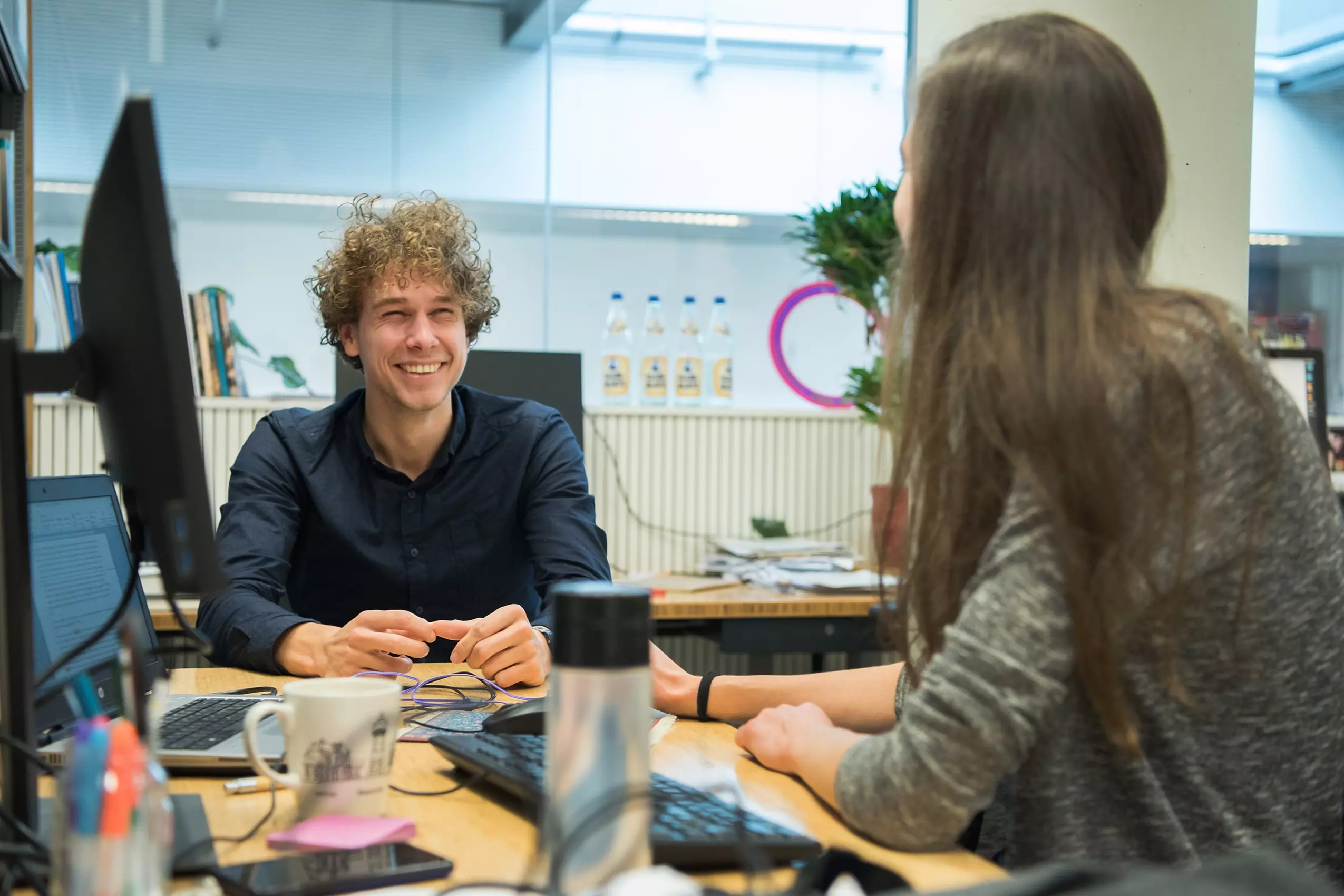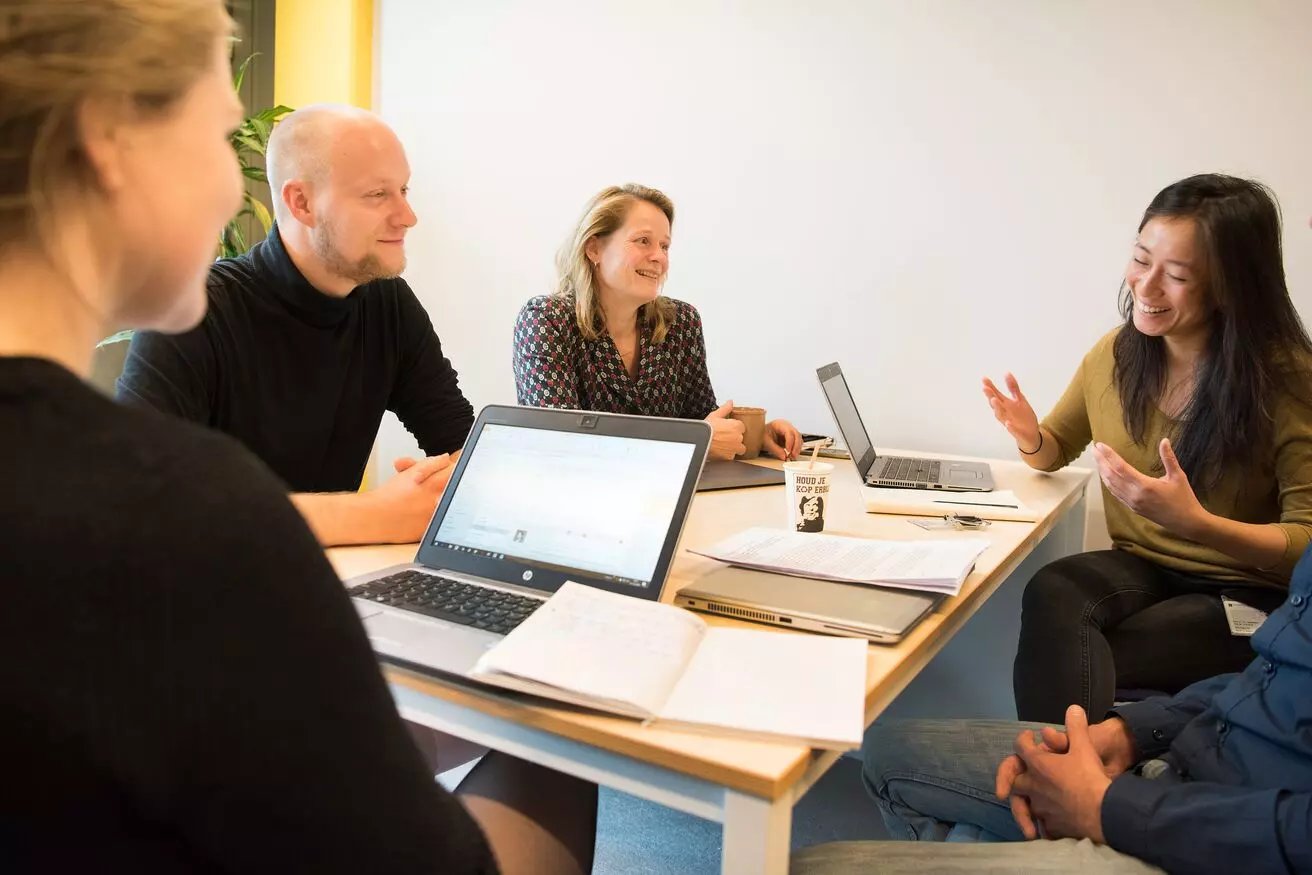.jpg)
Are you in interested in exploring the connection between movement behavior and ecological dynamics? Do you enjoy combining mathematical models and data to understand how ecological systems work? The Department of Theoretical and Computation Ecology is looking for an ambitious PhD student to work at the intersection of movement ecology and community ecology.
PhD Linking Individual Movement Behaviour and Population Dynamics
- Faculty of Science
- 14161
- Master's
- €2.901 - €3.707
- 38 hours
- Closes on18-07-2025

Are you in interested in exploring the connection between movement behavior and ecological dynamics? Do you enjoy combining mathematical models and data to understand how ecological systems work? The Department of Theoretical and Computation Ecology is looking for an ambitious PhD student to work at the intersection of movement ecology and community ecology.
PhD Linking Individual Movement Behaviour and Population Dynamics
- Faculty of Science
- 14161
- Master's
- €2.901 - €3.707
- 38 hours
- Closes on18-07-2025
Working at the UvA
About the position
This position is part of a 2-PhD student project funded by the Swiss National Science Foundation to link movement ecology and functional response theory. The dynamics of ecological communities arise from vast numbers of individual interactions, such as the consumption of prey by a predator. A critical factor determining the dynamics of interacting populations is how the strength of interactions among populations (number of interactions per unit time) varies as a function of the densities of both predator and prey populations. The shape of this relationship, known as the functional response (FR), has profound implications for the coexistence, collapse, or cyclical dynamics of two or more interacting populations. In this project, you will collaborate closely with an international team of experimental and theoretical ecologists from the University of Amsterdam, University of Zurich, and Cornell University. Your research will specifically explore how different functional response types arise from individual movement behaviours, with the goal of developing a mechanistic understanding of the links between individual-level behaviours and broader food web dynamics. You will work within an experimental system using protist communities, enabling high-resolution measurements of both behavioural and population-level data.

Working at the UvA
About the position
This position is part of a 2-PhD student project funded by the Swiss National Science Foundation to link movement ecology and functional response theory. The dynamics of ecological communities arise from vast numbers of individual interactions, such as the consumption of prey by a predator. A critical factor determining the dynamics of interacting populations is how the strength of interactions among populations (number of interactions per unit time) varies as a function of the densities of both predator and prey populations. The shape of this relationship, known as the functional response (FR), has profound implications for the coexistence, collapse, or cyclical dynamics of two or more interacting populations. In this project, you will collaborate closely with an international team of experimental and theoretical ecologists from the University of Amsterdam, University of Zurich, and Cornell University. Your research will specifically explore how different functional response types arise from individual movement behaviours, with the goal of developing a mechanistic understanding of the links between individual-level behaviours and broader food web dynamics. You will work within an experimental system using protist communities, enabling high-resolution measurements of both behavioural and population-level data.
All about this vacancy
What are you going to do?
Tasks and responsibilities:
- Develop mathematical models to scale up direct observations of individual movement behaviour to understand mechanisms that can lead to different functional response shapes in single-prey contexts.
- Fit and compare models using high-resolution movement data from an experimental protist system.
- Write up findings for peer reviewed international publications.
- Present findings at internal meeting and national and international scientific conferences.
- Assist with teaching courses in quantitative biology (10% of your time).
- Develop skills to become an independent scientist.
Your profile
Your experience and profile:
- Strong interest in fundamental research in ecology;
- Experience and interest in mathematical modelling;
- Some previous experience in data analysis;
- Familiarity with scientific programming in (e.g. R, Python, or Matlab);
- Strong communication abilities both orally and in writing.
Our offer
A temporary contract for 38 hours per week for the duration of 4 years (the initial contract will be for a period of 18 months and after satisfactory evaluation it will be extended for a total duration of 4 years). This should lead to a dissertation (PhD thesis). We will draft an educational plan that includes attendance of courses and (international) meetings. We also expect you to assist in teaching undergraduates and master students. For this position the University Job Classification profile “Promovendus” (PhD candidate) applies. Your salary will be €2,901 gross per month in the first year and will increase to €3,707 in the final year, based on full-time employment of 38 hours per week. This does not include 8% holiday allowance and 8.3% year-end allowance.
The preferred starting date is between September and November of 2025.
For this position the University Job Classification profile “Promovendus” (PhD candidate) is applicable.
The Collective Labour Agreement of Universities of the Netherlands is applicable.
Besides the salary and a vibrant and challenging environment at Science Park we offer you multiple fringe benefits:
- 232 holiday hours per year (based on fulltime) and extra holidays between Christmas and 1 January;
- multiple courses to follow from our Teaching and Learning Centre;
- a complete educational program for PhD students;
- multiple courses on topics such as leadership for academic staff;
- multiple courses on topics such as time management, handling stress and an online learning platform with 100+ different courses;
- 7 weeks birth leave (partner leave) with 100% salary;
- partly paid parental leave;
- the possibility to set up a workplace at home;
- a pension at ABP for which UvA pays two third part of the contribution;
- the possibility to follow courses to learn Dutch;
- help with registration at UvA- Housing for a studio or small apartment when you’re moving from abroad.
Are you curious to read more about our extensive package of secondary employment benefits, take a look here.
All about this vacancy
What are you going to do?
Tasks and responsibilities:
- Develop mathematical models to scale up direct observations of individual movement behaviour to understand mechanisms that can lead to different functional response shapes in single-prey contexts.
- Fit and compare models using high-resolution movement data from an experimental protist system.
- Write up findings for peer reviewed international publications.
- Present findings at internal meeting and national and international scientific conferences.
- Assist with teaching courses in quantitative biology (10% of your time).
- Develop skills to become an independent scientist.
Your profile
Your experience and profile:
- Strong interest in fundamental research in ecology;
- Experience and interest in mathematical modelling;
- Some previous experience in data analysis;
- Familiarity with scientific programming in (e.g. R, Python, or Matlab);
- Strong communication abilities both orally and in writing.
Our offer
A temporary contract for 38 hours per week for the duration of 4 years (the initial contract will be for a period of 18 months and after satisfactory evaluation it will be extended for a total duration of 4 years). This should lead to a dissertation (PhD thesis). We will draft an educational plan that includes attendance of courses and (international) meetings. We also expect you to assist in teaching undergraduates and master students. For this position the University Job Classification profile “Promovendus” (PhD candidate) applies. Your salary will be €2,901 gross per month in the first year and will increase to €3,707 in the final year, based on full-time employment of 38 hours per week. This does not include 8% holiday allowance and 8.3% year-end allowance.
The preferred starting date is between September and November of 2025.
For this position the University Job Classification profile “Promovendus” (PhD candidate) is applicable.
The Collective Labour Agreement of Universities of the Netherlands is applicable.
Besides the salary and a vibrant and challenging environment at Science Park we offer you multiple fringe benefits:
- 232 holiday hours per year (based on fulltime) and extra holidays between Christmas and 1 January;
- multiple courses to follow from our Teaching and Learning Centre;
- a complete educational program for PhD students;
- multiple courses on topics such as leadership for academic staff;
- multiple courses on topics such as time management, handling stress and an online learning platform with 100+ different courses;
- 7 weeks birth leave (partner leave) with 100% salary;
- partly paid parental leave;
- the possibility to set up a workplace at home;
- a pension at ABP for which UvA pays two third part of the contribution;
- the possibility to follow courses to learn Dutch;
- help with registration at UvA- Housing for a studio or small apartment when you’re moving from abroad.
Are you curious to read more about our extensive package of secondary employment benefits, take a look here.
Your place at the UvA
This is where you will work
The Institute for Biodiversity and Ecosystem Dynamics (IBED) is one of eight research institutes of the Faculty of Science at the University of Amsterdam. The research at IBED aims to unravel how ecosystems function in all their complexity, and how they change due to natural processes and human activities. At its core lies an integrated systems approach to study biodiversity, ecosystems and the environment. IBED adopts this systems approach to ecosystems, addressing abiotic (soil and water quality) and biotic factors (ecology and evolution of plants, animals, and microorganisms), and the interplay between those. The IBED vision includes research encompassing experimental and theoretical approaches at a wide variety of temporal and spatial scales, i.e. from molecules and microorganisms to patterns and processes occurring at the global scale. The University of Amsterdam has excellent high performance computing facilities. Furthermore, IBED has a dedicated computational support team with specialized knowledge of bioinformatics, (geo)database management and scientific programming. IBED also works with non-academic partners to deliver transdisciplinary science for society.
The position will be based in the Department of Theoretical and Computational Ecology. Research in the Department of Theoretical and Computational Ecology focuses on understanding the complexity of ecological systems by using theoretical and advanced computational approaches. Our department has specific expertise in both the analysis of animal movement and theoretical population dynamics which are the two fundamental sub-disciplines of ecology the position seeks to integrate.
More about the UvA
The University of Amsterdam is ambitious, creative and committed. An inspiration to students since 1632, a vanguard player in international science and a partner in innovation.
The University of Amsterdam is the largest university in the Netherlands, with the broadest range of courses on offer. An intellectual hub with 42,000 students, 6,000 staff and 3,000 PhD students. Connected by a culture of curiosity.
Your place at the UvA
This is where you will be working
This is where you will work
The Institute for Biodiversity and Ecosystem Dynamics (IBED) is one of eight research institutes of the Faculty of Science at the University of Amsterdam. The research at IBED aims to unravel how ecosystems function in all their complexity, and how they change due to natural processes and human activities. At its core lies an integrated systems approach to study biodiversity, ecosystems and the environment. IBED adopts this systems approach to ecosystems, addressing abiotic (soil and water quality) and biotic factors (ecology and evolution of plants, animals, and microorganisms), and the interplay between those. The IBED vision includes research encompassing experimental and theoretical approaches at a wide variety of temporal and spatial scales, i.e. from molecules and microorganisms to patterns and processes occurring at the global scale. The University of Amsterdam has excellent high performance computing facilities. Furthermore, IBED has a dedicated computational support team with specialized knowledge of bioinformatics, (geo)database management and scientific programming. IBED also works with non-academic partners to deliver transdisciplinary science for society.
The position will be based in the Department of Theoretical and Computational Ecology. Research in the Department of Theoretical and Computational Ecology focuses on understanding the complexity of ecological systems by using theoretical and advanced computational approaches. Our department has specific expertise in both the analysis of animal movement and theoretical population dynamics which are the two fundamental sub-disciplines of ecology the position seeks to integrate.
More about the UvA
The University of Amsterdam is ambitious, creative and committed. An inspiration to students since 1632, a vanguard player in international science and a partner in innovation.
The University of Amsterdam is the largest university in the Netherlands, with the broadest range of courses on offer. An intellectual hub with 42,000 students, 6,000 staff and 3,000 PhD students. Connected by a culture of curiosity.
Important to know
Your application & contact
If you feel the profile fits you, and you are interested in the job, we look forward to receiving your application. You can apply online via the ‘Apply’-button on the vacancy’s webpage. We accept applications until and including 18 July.
Applications should include the following information (all files besides your cv should be submitted in one single pdf file):
- a detailed CV including the months (not just years) when referring to your education and work experience;
- a letter of motivation with a clear explanation of 1) why you are interested in the position, and 2) your relevant experience which makes you well suited for the position;
- the names and email addresses of two references who can provide letters of recommendation.
Only complete applications received within the response period via the link below will be considered.
A knowledge security check can be part of the selection procedure.(for details: national knowledge security guidelines)
We will invite potential candidates for interviews soon after the closing date.
Do you have any questions, or do you require additional information? Please contact:
Ben Martin, Assistant Professor, [email protected]
Diversity, Equity & Inclusion
As an employer, the UvA maintains an equal opportunities policy. We value diversity and are fully committed to being a place where everyone feels at home. We nurture inquisitive minds and perseverance and allow room for persistent questioning. With us, curiosity and creativity are the prevailing culture.
Important to know
Your application & contact
If you feel the profile fits you, and you are interested in the job, we look forward to receiving your application. You can apply online via the ‘Apply’-button on the vacancy’s webpage. We accept applications until and including 18 July.
Applications should include the following information (all files besides your cv should be submitted in one single pdf file):
- a detailed CV including the months (not just years) when referring to your education and work experience;
- a letter of motivation with a clear explanation of 1) why you are interested in the position, and 2) your relevant experience which makes you well suited for the position;
- the names and email addresses of two references who can provide letters of recommendation.
Only complete applications received within the response period via the link below will be considered.
A knowledge security check can be part of the selection procedure.(for details: national knowledge security guidelines)
We will invite potential candidates for interviews soon after the closing date.
Do you have any questions, or do you require additional information? Please contact:
Ben Martin, Assistant Professor, [email protected]
As an employer, the UvA maintains an equal opportunities policy. We value diversity and are fully committed to being a place where everyone feels at home. We nurture inquisitive minds and perseverance and allow room for persistent questioning. With us, curiosity and creativity are the prevailing culture.
Other interesting vacancies for you

PhD Candidate in Cell Biology and Microscopy
- Faculty of Science
- €2.901 - €3.707
- Closes on17-08-2025
- Master's
- 38 hours
Are you fascinated by the molecular interactions that drive cellular processes and functions? Are you excited about using advanced microscopy methods and fluorescent probes to study cellular signalling? Then this may be the right job for you!
View vacancy

PhD Position in Quantum Simulation Theory
- Faculty of Science
- €2.901 - €3.707
- Closes on24-08-2025
- Master's
- 38 hours
Do you like developing new analytical and numerical techniques for(i) understanding equilibrium and out-of-equilibrium properties of quantum many-body systems;(ii) design robust protocols for entanglement generation for quantum enhanced sensing;(iii) develop new architectures for analogue and digital quantum simulation in hybrid quantum systems?In your PhD you will work on problems along these three directions, and work closely with experimental and theory collaborators in Amsterdam, Strasbourg, Joined Quantum Institute (JQI), and Sydney.
View vacancy

PhD Position in Quantum Simulation Theory: Hybrid Quantum Systems and Noise Mitigation
- Faculty of Science
- €2.901 - €3.707
- Closes on24-08-2025
- Master's
- 38 hours
Do you like developing new analytical and numerical techniques for:(i) understanding equilibrium and out-of-equilibrium properties of quantum many-body systems;(ii) design robust protocols for entanglement generation for quantum enhanced sensing;(iii) develop new architectures for analogue and digital quantum simulation in hybrid quantum systems?In your PhD you will work on problems along these three directions, and work closely with experimental and theory collaborators in Amsterdam, Strasbourg, Joined Quantum Institute (JQI), and Sydney.
View vacancy
Other interesting vacancies for you

PhD Candidate in Cell Biology and Microscopy
- Faculty of Science
- €2.901 - €3.707
- Closes on17-08-2025
- Master's
- 38 hours
Are you fascinated by the molecular interactions that drive cellular processes and functions? Are you excited about using advanced microscopy methods and fluorescent probes to study cellular signalling? Then this may be the right job for you!
View vacancy

PhD Position in Quantum Simulation Theory
- Faculty of Science
- €2.901 - €3.707
- Closes on24-08-2025
- Master's
- 38 hours
Do you like developing new analytical and numerical techniques for(i) understanding equilibrium and out-of-equilibrium properties of quantum many-body systems;(ii) design robust protocols for entanglement generation for quantum enhanced sensing;(iii) develop new architectures for analogue and digital quantum simulation in hybrid quantum systems?In your PhD you will work on problems along these three directions, and work closely with experimental and theory collaborators in Amsterdam, Strasbourg, Joined Quantum Institute (JQI), and Sydney.
View vacancy

PhD Position in Quantum Simulation Theory: Hybrid Quantum Systems and Noise Mitigation
- Faculty of Science
- €2.901 - €3.707
- Closes on24-08-2025
- Master's
- 38 hours
Do you like developing new analytical and numerical techniques for:(i) understanding equilibrium and out-of-equilibrium properties of quantum many-body systems;(ii) design robust protocols for entanglement generation for quantum enhanced sensing;(iii) develop new architectures for analogue and digital quantum simulation in hybrid quantum systems?In your PhD you will work on problems along these three directions, and work closely with experimental and theory collaborators in Amsterdam, Strasbourg, Joined Quantum Institute (JQI), and Sydney.
View vacancy

Don't miss out on your dream job!
Sign up for a job alert and you'll receive automatic updates about new and relevant vacancies.

Don't miss out on your dream job!
Sign up for a job alert and you'll receive automatic updates about new and relevant vacancies.
This website uses cookies
We, and third parties, use cookies on our website. We use cookies to ensure that our website functions properly, to store your preferences, to gain insight into visitor behavior, but also for marketing and social media purposes (showing personalized advertisements). By clicking 'Accept', you agree to the use of all cookies. In our Cookie Statement. you can read more about the cookies we use and save or change your preferences. By clicking 'Refuse' you only agree to the use of functional cookies.
